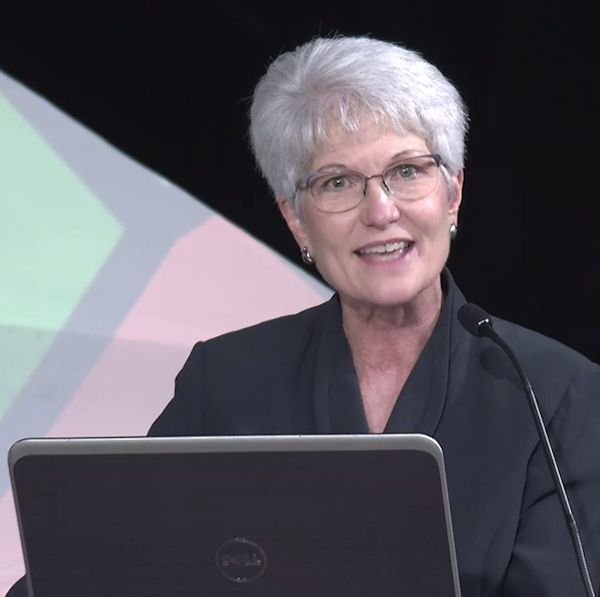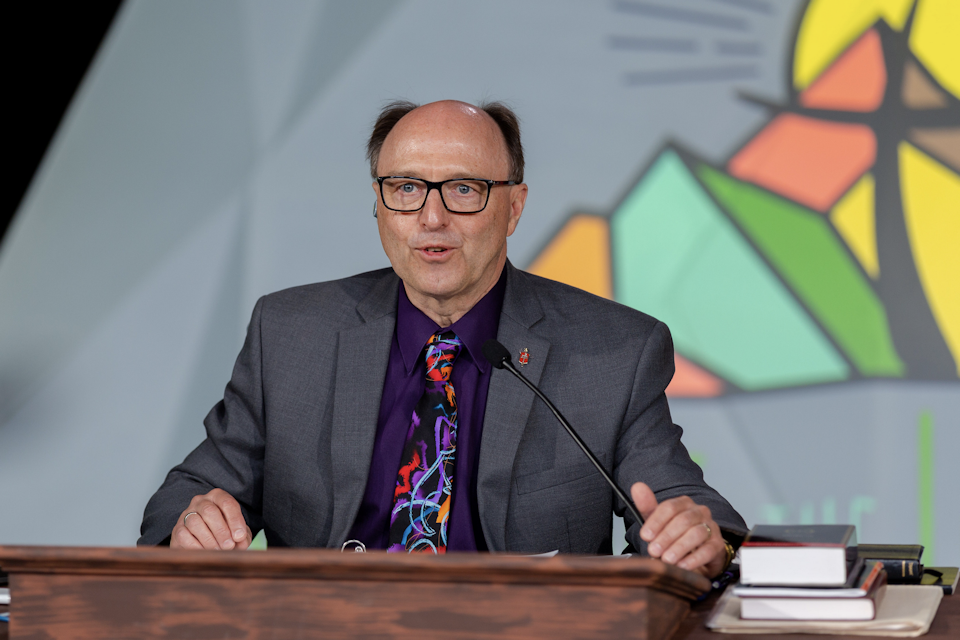Saturday, June 5, was a business day for the 2021 Virtual Michigan Annual Conference. Bishop David Bard and Secretary Joy Barrett helped members get their legislative work done.
KAY DEMOSS
Senior Content Editor

June 5, 2021 | LANSING — Saturday’s agenda at the 2021 Michigan Annual Conference included significant time for important legislation.
What a difference a year makes.
As business got underway, Bishop David Bard recalled, “Last year was our first attempt at a virtual annual conference and because we were uncertain about a number of aspects of the technology available to us, I asked persons who had submitted resolutions that went beyond necessary business if they would be willing to withdraw them. I remain very grateful that everyone agreed to do so in 2020.”This year, we opened up the resolution process and today we will be focused on addressing resolutions submitted.”
The 2020 Resolutions were not considered in legislative committees, as in previous annual conferences. They were addressed by committee of the whole in the plenary session. In 2021, members were assigned to one of eight legislative committees meeting on Tuesday or Wednesday evening on Zoom. At 6:00 pm Thursday evening, members had a Legislative Report in the inbox detailing the legislative committee action on each resolution. While Legislative Coordinator Diane Brown was not at the lectern as in previous years, she was working mightily behind the scenes.
In 2020, members voted on “essential” legislation on July 27 on a paper ballot, which they then returned by U.S. Mail. Those ballots were counted on August 28 and announced by Bishop Bard on September 7, 2020. Members of the 2021 Annual Conference voted electronically, which meant the results of votes were immediately known.
On Saturday morning, the bishop reminded members of Robert’s Rules and the Rules of the Annual Conference and then noted, “I am committed to both keeping the process moving and to making sure we are not moving so quickly as to lose people. We will be patient with each other as we do our work.”
More familiar with use of Zoom technology, after a year’s worth of practice, clergy and lay members entered into debate with enthusiasm.
Here is a listing of actions taken on resolutions. For detailed understanding consult:
- the Resolutions found in the 2021 Michigan Annual Conference Program Guide.
- the actions taken by the eight committees available in the 2021 Michigan Annual Conference Legislation Report.
Resolutions related to Pensions & Benefits:
All were approved when brought to a vote by Don Emmert, Conference Director of Benefits and Human Resources and Interim Chief Financial Officer for The Michigan Conference, on Friday morning:
R#2021-1 Established a 2022 Past Service Rate of $890; surviving spouse benefit remains 85%
R#2021-2 Established the Housing/Rental Allowance for retired clergy or clergy on medical leave
R#2021-3 2022 Conference Board of Pension & Health Benefits authorized to approve Comprehensive Benefit Funding Plan
R#2021-4 Conference Board of Pensions & Health Benefits authorized to address claims
Resolutions approved on the Consent Calendar on Friday:
R#2021-5 Conference policy on use of proceeds from sale and assets of local church properties — 50% given to Conference Council on Finance and Administration to be used for current or future capital expenditures and 50% to the district for distribution by district leadership team. (Forty percent of sales on Greater Detroit District to United Methodist Union of Greater Detroit and 10% to the district.)
R#2021-7 Creation of district working group — to submit legislation to the 2022 Annual Conference to reduce the number of districts by at least one, effective no later than January 1, 2023. Amenable to Conference Leadership Council.
R#2021-10 Affirm the Anti-Bias Anti-Racism Working Group formed by Bishop Bard — purpose to provide resourcing, support, and advocacy for local congregations and pastors engaged in ABAR work. Continue current membership and leadership. Amenable to the bishop. See more.
R#2021-11 Training and support for Cross Racial/Cross Cultural appointments — directs Board of Ordained Ministry and Cabinet to create and implement training and support for clergy and congregations in these appointments.
R#2021-13 Amend Michigan Conference Protection Policy-Online Ministry — amends previous policy with a 16-point section concerning online or virtual ministry.
R#2021-16 Addition to the Michigan Conference Parsonage Guidelines — Cabinet and Board of Ordained Ministry to recommend outgoing pastors be given at least the last two weeks (including two Sundays) off from all pastoral responsibilities. To help enter new appointment rested.
R#2021-18 Covenant Ministry Partnership with the Liberia Annual Conference. — affirmed what was adopted by the Liberia Annual Conference in February 2020. See more.
R#2021-19 Guidelines for Equitable Compensation support for 2022
R#2021-20 2022 Minimum Salary Schedule
Resolutions approved by vote of the plenary session:
R#2021-12 Anti Bias Anti Racism education and training for active clergy, conference, and district staff — amended during debate adding the word “education” to the word “training.” Presenter April Gutierrez noted, “The ABAR Working Groups hopes that we will create space for us to develop common language around race and the understanding of anti-bias … to help communities be more inclusive with a better understanding of cultures different from one’s own identity.” The motion passed with 87% approval.
R#2021-14 Inclusiveness of the Michigan Conference. — added to the Conference Plan of Organization a new section concluding with this statement: Nor shall any lay or clergy member be denied access to an equal place in the life, worship, ministry, governance of the conference, local church, or other organizational unit of the conference because of race, color, gender, sexual orientation, gender identity, relationship, ability, national origin, status, or economic condition. There was much debate with passion on both sides. Some felt “the time is now.” Others called for, “patience until things are more clear after General Conference.” Some said a vote postponing the resolution would promote unity in the conference. Others asserted that passing the resolution was a statement of identity, a clear articulation of the vision the Michigan Conference has for life together now and in the future. The scripture was cited as a reason not to adopt the resolution — “What do we do with the scripture that calls some lifestyles a sin?” The presenter emphasized that “We do not worship the Bible. We worship the God of love the Bible points to.” The conference theme was invoked on both sides of the question. “This type of motion exacerbates confusion and chaos … Let those of us [who are conservative] sing songs with you.” and “This resolution is a healthy step. We are not required to wait to sing God’s love song.”
A motion to postpone the vote indefinitely was defeated. No further amendments were offered. The resolution passed with approval of 68%.
Following the lunch break, Bishop Bard announced that a request for a ruling of law was made on R#2021-14. He said, “This means someone has challenged the disciplinary appropriateness of R#2021-14.” He explained a bishop has 30 days to issue such a ruling, which then is sent on to the Judicial Council for review.
R#2021-15 Transfer camping funds into MAUMC Foundation account — transfers Detroit Conference funds previously designated for camping from administration by the Michigan Conference to the Michigan Area Board of Christian Camping’s account with the Michigan Area UMC Foundation. The resolution passed with approval of 95%.
R#2021-17 Let’s overcome Christian Nationalism. Significant amendment was done in the Legislative Committee with the final resolution available on page 4 of the Legislation Report. Debate during plenary focused on the separation of church and state, appropriate expression of Christian principles and values in the life of the nation, righteous prayer, and the importance of public witness to the truth of the Gospel. The presenter closed with the statement: “Since we are Christ’s body, we are called to discern and witness to the truth. This is the truth that we can declare … the violent attack on Congress was neither patriotic nor Christ-like. True Christianity does not seek to control the country.” The resolution passed with approval of 75%.
Resolutions that were not approved:
R#2021-6 Vote on which post-separation church to join — non-concurrence in the Legislative Committee with a vote of 52 yes and 80 no than ruled out of order by Bishop Bard, allowing no further action by the plenary. The Bishop explained his decision. 1) An annual conference does not have the authority to vote to leave the United Methodist Church; 2) the rationale of the resolution suggests a “chain of decision-making” beyond simple discernment; and 3) the resolution does not include complete information about the possible “denominational futures” that could emerge from General Conference. The Bishop also made distinctions between R#2021-6 and the straw poll taken at the 2019 Michigan Annual Conference. The 2019 action was “clearly aspiration,” predicated on the change in the Book of Discipline by General Conference, and “non-binding.” R#2021-6 “assumes that powers will be granted that currently are not in our purview” and “seems to indicate that it is something more [than a straw poll].” See the Bishop’s full statement here.
R#2021-8 Retiree group health care plan, DAC health care plan amendment — was not approved by Legislative Committee and was not approved when returned to the floor in plenary. Director of Benefits and Interim CFO for the conference, Don Emmert, said, “The 2022 budget for all ministries is being reduced $500,000. The financial result of this resolution would require $830,000 to be added to fund the new liability. To help a few and decrease overall conference ministries would create inequity.” Ellen Zienert, Chair of the Conference Human Resources Committee, added that there are 37 additional persons not included in the resolution, who could request similar coverage. “If all were included, it would raise the cost to the Michigan Conference to $4 million.” The resolution failed by a 10% – 90% vote in the plenary.
R#2021-9 Recognize the unborn baby. A substitute motion was made in Legislative Committee — “That the Michigan Area Conference recognizes the unborn baby in the womb as biologically human from the moment of conception.” — that was then defeated in Legislative Committee. When brought back to the plenary, members asked for clarification about the intent of the resolution. The presenter said, “To recognize the weight of what it means for someone to be human. And to make decisions with the knowledge that the unborn is human.” Some expressed a concern that the statement in the resolution could be weaponized and used to offer condemnation rather than compassion to women. The presenter closed, “If we believe in the image of God, we cannot skirt that by denying the science and claim these brothers and sisters are not human.” The resolution failed by a 38% – 62% vote in the plenary.
The 2022 Conference Budget:
Members passed the 2022 Budget of $12,009,984 (found in detail here). The Rev. Brad Bartelmay, chair of the Conference Council on Finance and Administration, noted: 1) this is a decrease of 4% from 2021; 2) Benefits Budget of $3,720,000 is the same as 2021; 3) no increases in salary of superintendents or wages of conference staff; 4) General Church apportionments were based on the last quadrennium since General Conference has not met. See more remarks from Bartelmay here.
Last Updated on September 20, 2022

